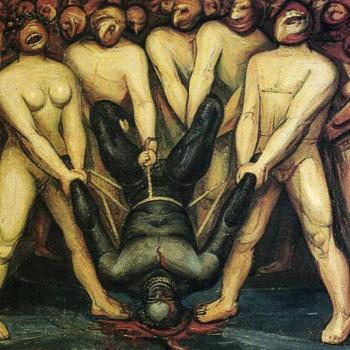
Donald Trump has once again upset the apple cart with his incendiary suggestion that four first-term female congresswomen (Ilhan Omar, Rashida Tlaib, Ayanna Pressley, and Alexandria Ocasio-Cortez) go back to the (presumably) shithole countries from which they came. The ensuing dust-up – amplified by send her back chants at Trump’s recent North Carolina rally – has predictably obscured rather than clarified matters, leaving us more befuddled than ever and raising questions about the value of a “language lens” on racism.
Casual Racism
Let’s talk about some of the challenges of a language lens on racism. Several years ago, Bill Maher’s comedic use of the term “house nigger” inspired a round of hand-wringing about casual racism. In the aftermath, Ice Cube showed up on Real Time and offered a clear-eyed perspective on the situation. This is what Ice Cube said to Bill Maher at the time. “It’s a word that has been used against us; it’s like a knife, man. And you can use it as a weapon, or you can use it as a tool. It’s been used as a weapon against us by white people, and we’re not gonna let that happen again…. That’s our word now. And you can’t have it back.”
Which is fair enough. But without defending the casual and gratuitous use of incendiary racial language, online brush fires that ignite when someone uses racially (in)sensitive language may not really help us to think properly about racism. Indeed, these brush fires can become smoke screens that misdirect our attention from racism’s enduring (and decidedly non-casual) psychological and institutional foundations. Racism is not really about language, and is certainly not caused by language (we should not confuse casual with causal).
Autonomous Individuality
The underlying emotional and psychological dynamics that do cause, institutionalize, and perpetuate racism are incredibly complicated (see, for example, Joel Kovel’s fascinating and disturbing White Racism: A Psychohistory, with its echoes of Norman O. Brown, first published in 1971). Owning up to and eradicating the racially disparate and unjust outcomes in our society requires honesty and introspection that is very difficult to summon. We are simply not used to thinking about the deeper psychological and broader social sources of inequity and injustice.
Instead, we default to rote images of the individual as autonomous agent, actor, and author of her life’s drama (a foundation concept of Thomist and Lockean philosophical traditions). We default to conflated behavioral-linguistic perspectives on social change. That our words constitute (cause / determine) reality. While heuristically satisfying, this default approach to understanding and addressing our most pervasive and deeply rooted social problems, almost by definition, will fail because the concept of autonomous individuality itself is deeply flawed.
Brownian Motion
We are not our own islands (as Melville would have it, isolatoes). We live in a Brownian world, energized and propelled by random, colliding interactions at every level of our existence – environmental, biological, social, and personal. This Brownian perspective applies no less to the specific behaviors and speech acts of individual humans than it does to the collisions of various populations.
As Walt Whitman wrote, “I contradict myself, I am large, I contain multitudes.” We all constantly iterate and endlessly revise ourselves. We are all rough drafts. Works in progress. We say and do stuff that we later regret, and while it’s entirely appropriate to call bullshit when someone with a public profile messes up, the important result is not the punishment inflicted, but the lesson learned.
The arc of one’s life, the direction, matters far more than specific speech acts, which from a Brownian perspective, actually do mostly constitute “noise” and not “signal”. At the same time, a Brownian perspective on how order and structure emerges from randomness, flux, chaos, and messiness can tell us a lot about how emotional responses to racial difference become reflexes that cement racist instincts into rigid social and political habits and institutions.
Grasping Complexity
We intuitively grasp this truth, that we are, in a sense, both less and greater than the sum our parts as individuals. Which is why so many people who probably actually are racist by even the loosest personal definition of the term (they spew racial epithets, eye with suspicion those who possess different skin color, instinctively assume other races receive preferential treatment that harms them) will still vehemently deny they are racist.
While these people may generally accept the “autonomous individual” premises of Western traditions, they resist the implication that “racism” defines their own individuality in some essential way (even while they might be happy to assume others, from other group identities, are “essentially” flawed or marred or defective). They appreciate their own complexity, even as they may deny this complexity to others.
Life Outcomes
If the goal, then, is to reduce the impact of racism, we need to focus less on specific behaviors of individuals and more on life outcomes of groups. How does racism influence these life outcomes – family stability, emotional health, higher education, professional success, stable income, community status? What would a world in which racism less directly affected life outcomes look like? What is the best way to remove barriers and create openings for populations most directly and persistently harmed by racism? How would these methods account for the more complex and messy roots of racism? One approach would be to adopt explicitly public health and “population health” lenses to help us think more deeply and creatively about what it would mean to stall vicious cycles that perpetuate racism and its effects and set in motion virtuous cycles that would loosen the grip of concepts and constructs of race on society.
Population Health
A population health perspective can more fully and cleanly account for and absorb both the external “motional” patterns of groups (as they slide, glide, and collide in relation to each other), along with the internal “emotional” patterns of individuals within groups, that benefit from and are harmed by racism. “Population health” refers to a shift in focus from individual health outcomes and personal health determinants (e.g., diet, exercise, genetics) to the social determinants of health. The population health perspective defines health not merely as the absence of disease or infirmity for an individual, but as the measurable, collective capacities of people to “adapt to, respond to, or control life’s challenges and changes.”
A major challenge for population health advocates is to reduce inequities and gaps in the health of populations produced by environmental, economic, and cultural circumstances. Population-based health care would recognize gun violence, stop-and-frisk policing, incarceration, homelessness, dental insurance, and childcare all to be examples of social determinants of health. The data-driven Healthy People 2020 initiative of the Department of Health and Human Services nicely illustrates the conceptual framework for thinking about population health and public health.
Emotional Stress
A vast body of data illustrates the negative impacts of racism on physical and emotional health. Most profoundly (among the many ways we can document racial inequity), racism embeds and embodies disproportionate amounts of emotional stress within minority communities. By almost every measure, minorities, simply by virtue of their skin color, face obstacles in any particular moment of their day that will produce extra quantities of tension and pressure (measured by cortisol response). The negative impact of these moments is accretive and amounts to asking racial minorities to carry a backpack that becomes incrementally heavier each day during their journey through life.
The cascading, flooding impact of this pervasive stress on life outcomes within minority communities is pernicious and extreme, with costs that extend well beyond these communities. And while we might also say that the history of the races in the United States has made all of us crazy, clearly our institutions and policies have perfected the art of burden-shifting so that the costs of this craziness are still borne by those among us whose ancestors were the initial victims of racial injustice.
Toward a (Partial, Halting, Tentative) Vision of Racial Equity
Because it rests on solid research and technical foundations, the population health approach offers robust tools for accelerating progress toward racial equity based on public health and social cost notions of the harms inflicted by racism. And because it steers clear of some of the more hot-button and easily exploited and abused impacts of individual behaviors and speech acts, the population health approach creates opportunities for building and sustaining broad foundations of public and political support for the goals of racial equity and racial justice. Finally, in helping us to escape from the heuristic trap of the autonomous individual, the population health approach frees us to consider the complex, shifting, and fractal nature of the interdependencies that characterize our relationship to ourselves and to the worlds we inhabit.
Casual Racism and Gratuitous Harm
As for racist language, it seems fair to say that people should not use racial terms of abuse, simply because this language is gratuitously harmful. There are not circumstances one can easily imagine that justify the distress caused by the use of racial epithets (although ironically, in the case of Bill Maher, controversial speech in the service of comedy may, sometimes, be one of those justifications). Language ownership and control may be contentious issues, but dignity and respect and memory are not.
Solutions-Based Racism Remedies
The Congressional vote to condemn Trump’s racist language mollified no one. For Democrats, whose 2018 election mandate was to respond firmly to the obviously racist politics and policies of the Trump presidency, no action short of impeachment can at this point suffice. However, impeachment alone obviously won’t dispel emotions of anger, confusion, fear, and loss dividing the American nation and dissolving its institutional foundations.
In this same week, the New York Times Daily has produced a podcast about the myth that school busing policies failed and The New Yorker has published a riveting story about the crisis of black land loss in the American South. These reports focused new attention on the real property and wealth inequity foundations of racial injustice. The Democratic Party should pivot away from the language lens on racism and toward real property legal and institutional remedies. Attaching party’s politics and policies to a robust and radical solutions-based agenda would more directly and effectively address the profound impacts of racial injustice and inequity on the life outcomes of African-Americans.












